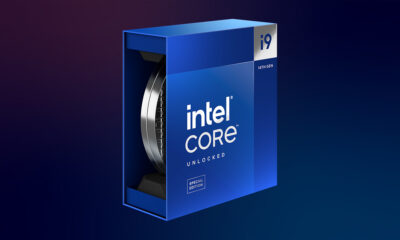News
Intel Invests Additional $15 Billion In Israeli Chip Facility
Intel’s huge investment comes in addition to the $10 billion already committed by the well-known processor company back in 2019.

On Sunday, Israel’s Ministry of Finance announced that the country had reached a new agreement with processor giant Intel that will see $25 billion of investment go towards an updated chip-making facility in Kiryat Gat.
The investment adds another $15 billion on top of the $10 billion earmarked for the proposed factory back in 2019, after the global COVID pandemic delayed construction. The new facility will be significantly more advanced than in the original plans, forming part of a larger production site known as Megafab.
Intel hasn’t yet commented directly on the investment details, but a press release was quick to praise Israeli expertise: “Israel is a global center of technical talent and innovation and one of Intel’s significant global manufacturing and R&D centers. Since its establishment in 1974, Intel Israel has played a crucial role in Intel’s global success. Our intention to expand manufacturing capacity in Israel is driven by our commitment to meeting future manufacturing needs and supporting Intel’s IDM 2.0 strategy, and we appreciate the continued support of the Israeli government”.
Also Read: Dubai Hospital Delivery Drone Completes Successful First Trial
Formal approval of the new agreement is expected to happen in a few weeks as Intel ramps up its international efforts to expand worldwide production capacity. According to a press release from the Israeli finance ministry, thousands of additional technicians will be required in Kiryat Gat, with Intel offering higher wages than the industry average. Additionally, the processor company has agreed to increase its tax obligations from 5% to 7.5%. Intel aims to close the investment deal and commence plant operations by 2027, operating the complex until at least 2035.
As manufacturers like Apple opt to develop their own processor architectures, Intel increasingly needs to adapt to a changing global market worth trillions of dollars. The company’s recent investment in Israel comes shortly after announcing a $4.6 billion deal to build a chip assembly and testing facility in Warsaw, Poland, and joins existing manufacturing facilities in Ireland and Germany.
News
Alienware Just Announced Six New Gaming Monitors
The new models include three QD-OLED and three budget-friendly QHD options, expanding the company’s lineup for all gamers.

Alienware has just updated its gaming monitor lineup with six new additions, including the highly anticipated Alienware 27 4K QD-OLED Monitor. The latest wave of releases is set to reach more gamers than ever, offering high-end QD-OLED displays alongside more budget-friendly options.
The latest displays clearly show that the company is doubling down on QD-OLED with three new models sporting the technology. A redesigned Alienware 34 Ultra-Wide QD-OLED Monitor is also making a return, further refining what is already a fan-favorite display.
A Unified Design: The AW30 Aesthetic
All six monitors feature Alienware’s new AW30 design language, first introduced at CES. The AW30 aesthetic brings a futuristic, minimalist look that unites the entire lineup under a cohesive visual identity.
Pushing QD-OLED Even Further
The refreshed Alienware 34 Ultra-Wide QD-OLED Monitor (AW3425DW) builds on its predecessor’s success with a 240Hz refresh rate (up from 175Hz) and HDMI 2.1 FRL support. It also gains G-SYNC Compatible certification alongside AMD FreeSync Premium Pro and VESA AdaptiveSync, ensuring ultra-smooth performance. With a WQHD (3440×1440) resolution and an 1800R curve, this display enhances immersion for both gaming and cinematic experiences.
For those who crave speed, the Alienware 27 280Hz QD-OLED Monitor (AW2725D) pairs a high refresh rate with QHD resolution, balancing sharp visuals with ultra-smooth gameplay. Meanwhile, the Alienware 27 4K QD-OLED Monitor (AW2725Q) delivers stunning clarity with an industry-leading pixel density of 166 PPI, making it the sharpest OLED or QD-OLED monitor available.
Also Read: Infinite Reality Acquires Napster In $207 Million Deal
Worried about OLED burn-in? Alienware’s entire QD-OLED lineup comes with a three-year limited warranty covering burn-in concerns, offering peace of mind for gamers investing in these high-end displays.
Bringing QHD To A Wider Audience
Alongside QD-OLED, Alienware is also releasing three new QHD gaming monitors aimed at more price-conscious gamers. The Alienware 34 Gaming Monitor (AW3425DWM), Alienware 32 Gaming Monitor (AW3225DM), and Alienware 27 Gaming Monitor (AW2725DM) provide a range of sizes and formats to suit different preferences:
- The Alienware 34 Gaming Monitor (AW3425DWM): An ultrawide (WQHD) option for a panoramic, immersive experience.
- The Alienware 32 Gaming Monitor (AW3225DM): A standard 16:9 panel for a traditional but expansive desktop setup.
- The Alienware 27 Gaming Monitor (AW2725DM): A 27” display offering the same performance in a more compact form factor.
All three gaming monitors feature a fast 180 Hz refresh rate, a 1ms gray-to-gray response time, and support for NVIDIA G-SYNC, AMD FreeSync, and VESA AdaptiveSync to eliminate screen tearing. Additionally, with 95% DCI-P3 color coverage and VESA DisplayHDR400 certification, these displays deliver vibrant colors and high dynamic range for lifelike visuals.



























